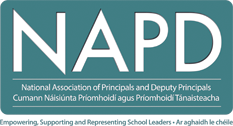Learn more about our history
NAPD History
NAPD - A History
In 1997, there were six associations trying to look after the interests of Principals and Vice-Principals and a growing feeling that as long as the post-primary sectors were served by separate organisations there was little hope of them making real headway in representing the voice of school leaders. A process of tentative contacts, diplomatic negotiations, meetings took place over the period of a year as the consensus grew among school leaders about the need for a united organisation
It is a testimony to the power of an idea which, once it took root, grew with astonishing strength and rapidity.
There were key moments in the gestation of one of the most significant bodies in Irish post-primary education:
On 12th May 1997, representatives of the newly-christened NAPD met the Minister, Micheál Martin, at Leinster House. His response was warm, positive and encouraging. He enthusiastically accepted an invitation to launch the new association and he said “the establishment of one association helped to recognise the role and status of Principals and Deputy Principals as partners in education”. Collins Barracks was selected as the venue for the inauguration of the Association.
On the 22nd of September, 1998 over 150 distinguished guests from across the educational spectrum heard the first President of NAPD, Shay Bannon, emphasise the sense of unity and trust that had evolved among those engaged in negotiating and planning the process.
In February 1999, Mary McGlynn, Principal of Mount Anville, a founder member of the NAPD Executive, was appointed Director of NAPD.
In the intervening years, through its 21-strong Executive Committee, a network of nine regional branches, a range of sub-committees working on specific areas of education and its annual conferences, NAPD has become a major partner in Irish education, enjoying a cordial and constructive relationship with the DES, consultative status with the NCCA, representation on a wide range of educational, social and cultural organisations and contacts with educationalists across the globe.

